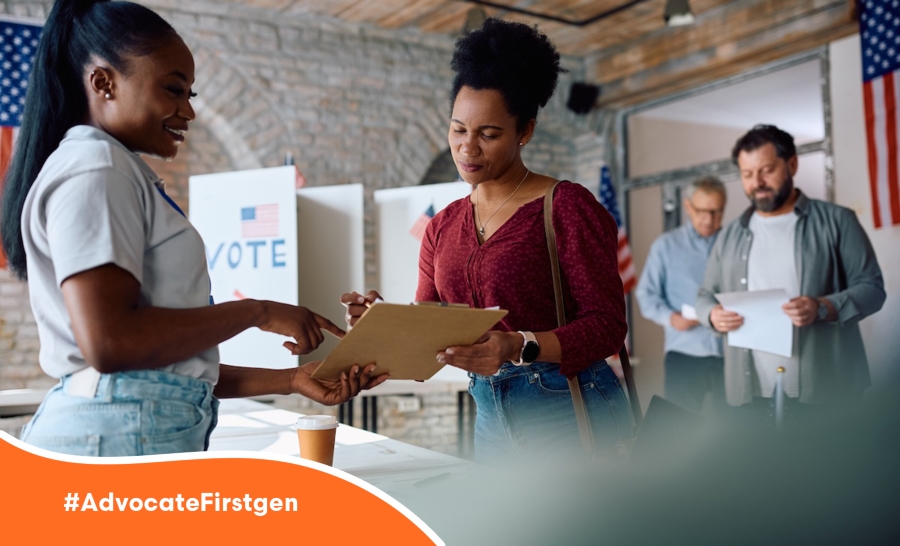FirstGen Forward announces new Network Leader institutions
Twenty new schools selected for commitment to advancing the success of first-generation students
FirstGen Forward / September 03, 2024

First-Generation College Celebration (FGCC) is an annual campaign to recognize the first-gen community’s achievements and dismantle the systemic barriers hindering its success across education, career, and life.
While FGCC always creates opportunities to #AdvocateFirstGen around November 8, first-gen students and their advocates have a unique opening this year: the 2024 General Election on Tuesday, November 5.
First-gen college students uniquely benefit from increased civic engagement. Activities like voting can increase first-gen students’ cultural, academic, and social capital. Increased social capital enhances first-gen students’ persistence and career development.
Moreover, first-gen students are particularly receptive to civic engagement-related calls to action. First-gen students are eager to “give back” to their communities, and they are therefore more likely than their continuing-gen peers to work for nonprofit organizations or local, state, or federal governments.
While today’s college students are more civically engaged and vote at higher rates than those of previous generations, just 31% of college students voted in the 2022 midterms (down from 40% in the 2018 midterms). Mobilization efforts targeting first-gen students and others most receptive to voting-related calls to action are essential to protecting turnout gains and their student success benefits.
Connect public policy decisions to students’ fields of study
Students are most likely to vote when they understand how issues on their ballots relate to their interests and careers. Incorporating public policy topics into coursework can help students see how governmental decision-making impacts their fields. This is especially important for those in STEM majors, who might not face public policy questions as frequently as those in the social sciences. For example, a computer science professor might ask students to assess how proposed artificial intelligence regulations might affect the development of new machine learning models.
Faculty can consult resources like Ask Every Student’s “Your Major on the Ballot” guide for help identifying major-related public policy issues and related readings they can incorporate into their syllabi to strengthen connections between coursework and civic engagement.
Use interdependent messaging when discussing the importance of voting
Students increasingly conceive of citizenship as an enterprise focused on collective action rather than focused on individual rights. This is especially true for first-gen students, who tend to endorse interdependent over independent cultural norms.
When first-gen students are a voter-mobilization message’s audience, that message should emphasize how students can leverage their votes to improve conditions for their communities and loved ones instead of a student’s ability to promote the student’s personal freedoms. Connecting public policy debates to students’ communities can be particularly effective in motivating students to vote.
Identify and engage peer voting champions
Peer groups strongly influence student attitudes and behaviors. Connect with student leaders who vote and ask them to share the reasons they do so in campus publications and across social media (the place where 70% of young voters get their election news). You should also prepare talking points for student influencers to use in regular peer mentoring sessions to facilitate conversation about voting and other civic engagement opportunities.
Make Election Day a campus holiday
While first-gen students may want to vote, many may not have time to do so. 66% of first-gen students are employed and 27% have dependents. Election Day is not a federal holiday, and just twenty-two states require employers to provide paid time off for voting.
Campuses should designate Election Day as an institutional holiday to give students more time to exercise their fundamental right to vote. The George Washington University recently designated every presidential general Election Day a university holiday—canceling synchronous classes and providing a paid day off for staff.
Use first-gen-focused voter mobilization resources
This year, FirstGen Forward and the Council for Opportunity in Education have partnered with the ALL IN Campus Democracy Challenge to curate resources to support your campus’s voter mobilization efforts leading up to this crucial election.
We encourage you to incorporate this custom voter registration portal into your FGCC marketing plan. Students, faculty, staff, and alumni can use the portal to register to vote or verify their registration status.
Once registered, encourage stakeholders to pledge to vote in 2024. Citizens are more likely to vote if they’ve made a public commitment—making this tool an excellent way for campus community members to remain accountable for voting.
Conclusion
From the local school board to the White House, voting in every election is important—especially for first-gen students and their advocates. The 2024 General Election’s proximity to this year’s First-Generation College Celebration provides an excellent opportunity for first-gen student success champions to #AdvocateFirstGen.